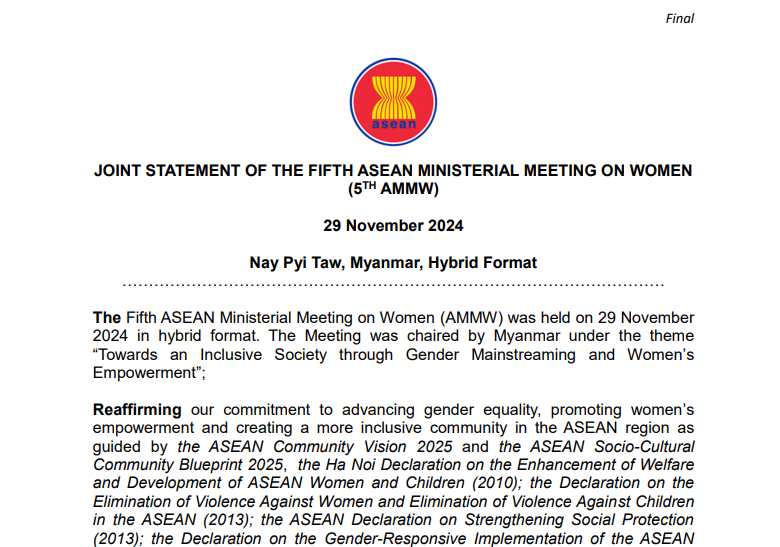JOINT STATEMENT OF THE FIFTH ASEAN MINISTERIAL MEETING ON WOMEN
(5TH AMMW)
29 November 2024 Nay Pyi Taw, Myanmar, Hybrid Format …………………………………………………………………………………………

The Fifth ASEAN Ministerial Meeting on Women (AMMW) was held on 29 November 2024 in hybrid format. The Meeting was chaired by Myanmar under the theme “Towards an Inclusive Society through Gender Mainstreaming and Women’s Empowerment”;
Reaffirming our commitment to advancing gender equality, promoting women’s empowerment and creating a more inclusive community in the ASEAN region as guided by the ASEAN Community Vision 2025 and the ASEAN Socio-Cultural Community Blueprint 2025, the Ha Noi Declaration on the Enhancement of Welfare and Development of ASEAN Women and Children (2010); the Declaration on the Elimination of Violence Against Women and Elimination of Violence Against Children in the ASEAN (2013); the ASEAN Declaration on Strengthening Social Protection (2013); the Declaration on the Gender-Responsive Implementation of the ASEAN Community Vision 2025 and Sustainable Development Goals (2017); the Joint Statement on Promoting Women, Peace and Security in ASEAN (2017); the ASEAN Comprehensive Recovery Framework (2020); the ASEAN Declaration on Building a More Sustainable, Inclusive and Resilient Future: Unlocking Women’s Entrepreneurship (2022); the ASEAN Regional Plan of Action on Women, Peace and Security (2022); and the ASEAN Gender Mainstreaming Strategic Framework (2021- 2025) ; and the ASEAN Declaration on Gender Equality and Family Development (2023) which recognise the important role of women in fostering sustainable and inclusive development and building a people-oriented, people-centered ASEAN Community;
Commending the considerable progress in advancing women's empowerment and gender equality in the ASEAN region, especially on removing barriers to education; improving health and well-being outcomes, living conditions and access to social welfare and security; increasing women’s participation in the labour force; promoting women meaningful role in entrepreneurship and leadership; and enhancing economic opportunities for women;
Recognising the intersecting factors of discrimination and marginalisation that impact women and girls differently, as well as the emerging challenges faced by women and girls in the region amid changing global and regional landscape, including the socioeconomic challenges in the COVID 19 pandemic context, geopolitical tensions, climate change, economic inequalities, care burden, as well as negative impacts of information technology/digital transformation on women and girls;
Acknowledging that to achieve gender equality and empowerment of women and girls, gender mainstreaming strategies and initiatives are crucial to create an enabling environment through among others, building institutional capacities, strengthening policy advocacies and gender-responsive budgeting, developing monitoring and evaluation tool as well as ensuring sex-disaggregated data collection and analysis to assist in identifying gaps, challenges and opportunities for improving inclusivity and sustainability.
Acknowledging Further that systematic approaches are critical in achieving an inclusive and equal community and in addressing barriers and challenges that hinder the attainment of gender equality and realisation of women and girl's rights in the region;
Emphasising the importance of gender mainstreaming as a key strategy to promote gender equality and women's empowerment across all sectors and pillars, as well as at all levels of policymaking and implementation;
Do HEREBY:
Strengthen /Intensify efforts to integrate gender responsive perspectives in the development, implementation, monitoring, and evaluation of policies, programmes, and initiatives across ASEAN and at all levels of cooperation;
Encourage the adoption of innovative approaches to address the barriers that limit access to education, health care, unpaid care work, informal economy and social protection, women’s participation in economic and political spheres, including genderbased violence (GBV), family burden and unpaid care, harmful gender stereotypes and social-cultural norms, gender digital divide, limited finance resources, the impacts of climate change and discrimination in mainstream and social media; digital transformation/initiatives associated with green economy and circular economy;
Support the institutional mechanisms to establish gender units at national and local levels, and where appropriate, to assign national focal points ensuring they are wellresourced and empowered with capacity development to implement and monitor gender and development initiatives;
Promote women's leadership and decision-making in all spheres at national, regional and international levels, to ensure that girls and women's voices and perspectives are heard and reflected in the decision-making process;
Intensify efforts to ensure that the social welfare services cater to the needs of the vulnerable groups, including GBV survivors;
Foster women’s participation and equal access to decent work and social protection for women across formal and informal sectors, and encourage the adoption of genderinclusive practices to ensure equal opportunities for women at all level of the workforce;
Enhance the collection, analysis, and use of sex-disaggregated data and gender statistics to inform evidence-based policymaking and programming for women's empowerment and gender equality;
Strengthen the collaboration across all ASEAN Sectoral Bodies and Entities, ASEAN Partners and relevant stakeholders to accelerate the achievement of gender equality and women's empowerment in the region;
Task the ASEAN Committee on Women (ACW) to accelerate the implementation of its current work plan (2021-2025) and to ensure that the upcoming ACW work plan (2026-2030) fully integrates and aligns with the ASEAN Community Vision 2045 and Strategic Plans in addressing the diverse and intersectional needs of all women and girls across ASEAN; and to ensure gender accountability across ASEAN’s pillars and sectoral bodies.
We reaffirm our commitment to the ASEAN vision of a rules-based, people-oriented, and people-centered ASEAN Community, where women and men are equal partners and beneficiaries of sustainable development.
Adopted on this Twenty-Ninth Day of November in the Year Two Thousand and Twenty-Four.